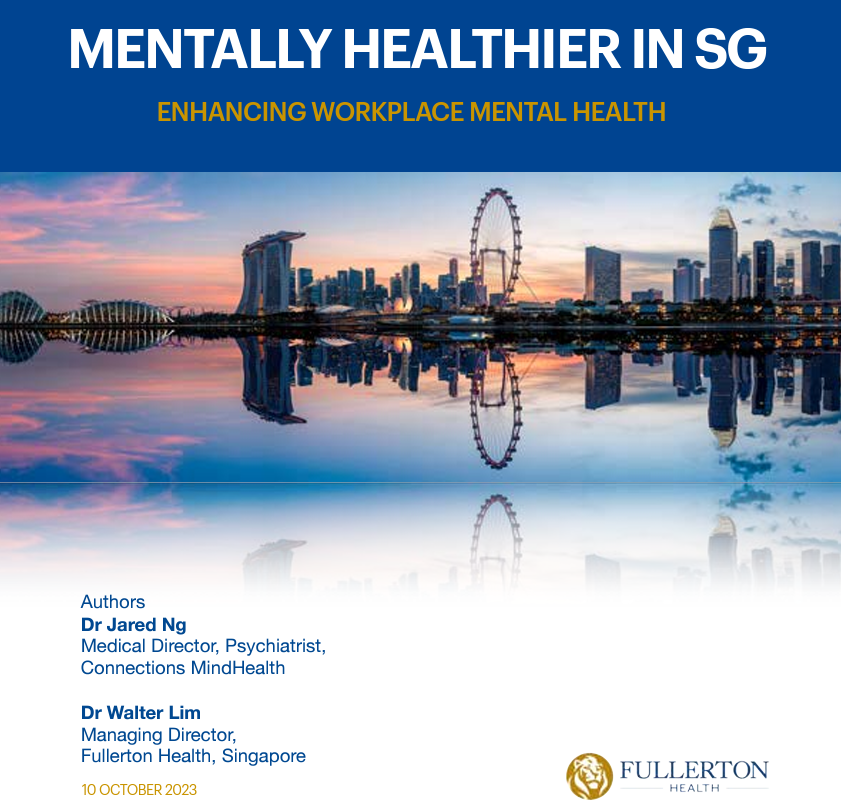Corporates
Mental health conditions can affect employee performance and satisfaction.
A successful workplace relies on a mentally healthy workforce
Mental health issues are a major concern
Stress, anxiety and depression are the most common in the corporate world.1
Poor mental health impacts productivity
Employees suffering from these conditions often struggle to perform at their best.
Enhanced satisfaction and retention
Companies that prioritise mental health tend to have higher employee satisfaction and lower turnover rates.2
Confidentiality is key
Employees need to feel safe to seek help.
Understanding common

Lack of a supportive work environment
When mental health is stigmatised and not openly discussed, it creates a culture where employees don’t feel comfortable seeking for help.
No confidentiality
Employees may not feel safe in fear of confidentiality and privacy issues.
Low employee productivity
Mental health issues can significantly impact performance, increase absenteeism and decrease overall job satisfaction.
Absence of training
Managers and supervisors may not be able to recognise the signs of mental health issues and respond effectively.
Little resources
Employees may not have access to mental health professionals and Employee Assistance Programs (EAPs) to provide adequate support for employees.
Shortage of holistic understanding
Companies may not recognise that personal and work life are interconnected and that employee well-being is affected by events in and outside of work.

Depression
Depression is a serious mental health condition that can significantly impact an employee’s ability to function effectively in the corporate world. Persistent feelings of sadness, loss of interest in work and difficulties in carrying out daily tasks can lead to decreased productivity, increased absenteeism and strained professional relationships.
COMMON SYMPTOMS
- Persistent feelings of sadness or hopelessness
- Loss of interest or pleasure in work or work-related activities
- Difficulty concentrating, making decisions or completing tasks at work
- Decreased energy or increased fatigue at work
- Feelings of worthlessness or guilt related to work performance
Anxiety
Unlike regular nervousness, anxiety triggered by job security, performance pressures or having to deal with challenging situations may overwhelm and interfere with an employee’s daily life and general well-being.
COMMON SYMPTOMS
- Excessive worry
- Feeling overwhelmed
- Difficulties concentrating
- Changes in sleep or appetite
Burnout
Burnout is a state of chronic physical and emotional exhaustion often linked to high workloads, tight deadlines or interpersonal conflicts at work. It can lead to a decrease in work performance and personal well-being. Moreover, prolonged burnout is a risk factor for more serious mental health disorders such as depression and anxiety.
COMMON SYMPTOMS
- Chronic fatigue or lack of energy
- Increased irritability or moodiness at work
- Feeling overwhelmed or unable to cope with work demands
- Constant worrying or racing thoughts about work
- Difficulty concentrating or making decisions related to work tasks
How we can help
Investing in mental health in the workplace is not just the right thing to do; it is also good for business. If you have specific corporate mental health needs, we can partner with you to provide tailored services for your organisation. Here is how Connections MindHealth can help.
Educate your team
With our Employee Education & Awareness Programs, we can help regularly educate your team about mental health to reduce stigma and encourage those who are struggling to seek help.
Provide resources
Through our Assessment, Counselling & Therapy Services, your team can have access to experienced and licensed mental health professionals. We also offer Mental Health Evaluations for early identification and effective management of potential mental health issues.
Equip your managers
With our Managerial and Supervisor Training, your managers will be equipped with the necessary knowledge and skills to handle mental health-related issues effectively.
Confidentiality and safety
Privacy and confidentiality are priorities to us. We implement robust protocols to guarantee the safety and comfort of clients and adhere to standards set by the Ministry of Health (MOH) and Singapore Medical Council (SMC).
Shaping a supportive future in the office
Good management of mental health in the corporate environment involves creating a supportive, open and inclusive culture.
Regularly educating employees through mental health workshops, seminars or online resources can improve mental health literacy and reduce stigma. This can help employees feel more comfortable seeking help and can foster a culture of empathy within the organisation.


Updates on workplace mental health
Fullerton Health and Connections MindHealth have jointly released a Healthcare Brief, titled “A Framework for Action: Enhancing Mental Health in the Workplace,” which addresses significant challenges related to mental health in the workplace. The document emphasizes the need for a paradigm shift in how mental health is approached at work and highlights key challenges, including awareness and acceptance, access to mental health professionals, and financing for working adults. Download the brief here.


Creating a positive work culture
Providing support
EAPs and mental health professionals can help assist employees in resolving personal or mental health problems that may be adversely affecting their performance at work.
Support should also be available for those returning to work after a mental health-related absence to ensure they are reintegrated into the workplace in a supportive and respectful manner.
Encouraging work-life balance
Flexible working hours, remote work options and ensuring employees take regular breaks can promote work-life balance. This not only helps to reduce stress and prevent burnout but also promotes overall well-being for increased productivity, improved job satisfaction, and a more engaged workforce.
Training managers
This can involve training in mental health first aid and how to have supportive discussions about mental health with their team. By equipping managers with these skills, they can provide immediate support to employees who may be struggling and help foster an empathetic environment.
Ask our team your questions or get help scheduling an appointment—we are here to support you in any way we can.
Frequently asked questions
As a corporate leader, how can I create a supportive environment for mental health in my organisation?
As a corporate leader, fostering a supportive environment for mental health is crucial. You can do this by promoting open conversations about mental health to reduce stigma, implementing policies that support work-life balance and providing mental health resources or benefits to your employees. Regular workshops or seminars on mental health can also be beneficial. Remember, a mentally healthy workforce is a productive one.
I am an employee and I am struggling with mental health issues. Will seeking help affect my job?
If you are someone struggling with mental health issues, it is important to know that seeking help is a sign of strength, not weakness. Many organisations are increasingly recognising the importance of mental health and have policies in place to support employees. Confidentiality is key in mental health discussions and your privacy should be respected. If you have concerns, it is always a good idea to check your company’s policies or speak to your HR department.
How can our organisation handle mental health crises in the workplace?
Having a plan in place to handle mental health crises is crucial. This can include training managers to recognise signs of a mental health crisis, providing resources like EAPs and having a protocol for immediate response. The safety and well-being of your employees should always be the top priority.
What kind of mental health resources can we provide to our employees?
There are many resources you can provide to support your employees’ mental health including EAPs, mental health days, flexible working hours and access to mental health professionals. Workshops or seminars on mental health can also be beneficial. The goal is to create a supportive environment where employees feel comfortable seeking help.
REFERENCES
Zachariah, N. A. (2023, June 28). Anxiety, depression could be costing Singapore’s GDP almost $16b a year. The Straits Times.
https://www.straitstimes.com/singapore/anxiety-depression-could-be-costing-singapore-s-gdp-almost-16b-a-yearAarons-Mele, M. (2018, November 1). We Need to Talk More About Mental Health at Work. Harvard Business Review. Retrieved August 7, 2023,
from https://hbr.org/2018/11/we-need-to-talk-more-about-mental-health-at-work

